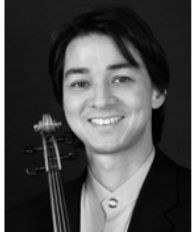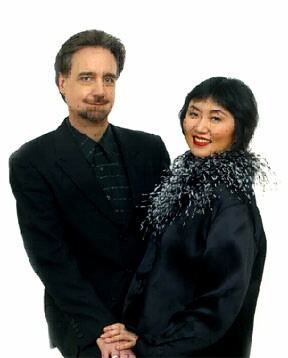Huge Line-up Continues at Menlo Festival
Music@Menlo’s fourth concert showcased seven works from the early twentieth century. Debussy ushered in an age of world wars with his Violin Sonata, written in 1916-17, late in his life. Fighting a final illness, he composed this piece with the gentle joy which inhabits much of his later work, using an “impressionist” palette, one of his legacies to music.
Ian Swensen, a hometown violinist profiled in the July 30 Piedmont Post, moved from private playfulness to a deliberate sort of melancholy, with an emotional fluency which brought the piece to life. The centers of phrases were thickly bowed, from lush to stormy, while the edges supplied vulnerability.
 Accompanied by pianist Anna Polonsky, they moved into the very interior second movement, repeated notes fresh and sounding improvised. With loose rhythms requiring careful cooperation, the piano entered its own, adding striking doubling.
Accompanied by pianist Anna Polonsky, they moved into the very interior second movement, repeated notes fresh and sounding improvised. With loose rhythms requiring careful cooperation, the piano entered its own, adding striking doubling.
Swensen returned to dramatic with huge violin runs that puddled down among rumbling piano notes, then reprised the quieter beginning. He was acrobatic, personal and very French, with a reverie-like interpretation and moving performance.
The Escher String Quartet next appeared with Stravinsky’s early Three Pieces for String Quartet. Violinist Adam Barnett-Hart prepared us with his insights into the piece. “On first reading we were confused and baffled. What Stravinsky was trying to do was reflect Cubism: we were all playing our own parts, and they are very different. The second movement uses collage techniques.” The third, slow and religious, returns to cubism.
This attention to the starker artists of his day was a perfect rejoinder to Debussy’s watery sparkle and cheerier impressionism.
Second violin Wu Jie used coarse bowing to highlight a Russian dissonance, while folk melodies exposed themselves over the sparse instrumentation. A lilt entered in the second movement, with sforzando evoking the dance of an off-balance clown. Tight church harmonies in the Canticle changed in mid-bow to something cleaner and fiercer, for a surprisingly modern offering.
The Escher Quartet then turned to Louis Gruenberg for a look at early American modernism. His search for an American idiom started out with gypsy references and moved into jazz, ending with flashes of Eastern pentatonic. Each instrument keeps to its register, with really lovely viola writing performed by Pierre LaPointe. The cello moved down to act as bass while the violins tossed off delicate cat calls.
Baritone Robert Gardner sang five Charles Ives songs with larger-than-life emotions better suited to operatic material. He was accompanied by Polonsky, whose piano score was often at odds with the vocal line, even wandering into other keys! “Down East” showed off lovely control and wistful scales, then dropped into campy folk.
After an intermission SF Symphony’s William Bennett added his oboe to Britten’s early Phantasy, op. 2. Just eighteen when he wrote this, Britten is fresh and deep, with lyrical oboe offset by more dissonant strings.
Clarinetist Anthony McGill came on-stage for Prokofiev’s Overture on Hebrew Themes, op. 34, backed by Ian Swensen and Jorja Fleezanis on violins, Paul Neubauer on viola, and David Finckel on cello. This high-powered cast cranked things up just when other concerts might be satisfied and coasting to the encore. Fleezanis is concertmaster of the Minnesota Orchestra. Neubauer brought the house down in Concert III with his power and direct warmth, and Finckel is Music@Menlo’s cofounder and a member of the prestigious Emerson quartet.
McGill announced that he had a surprise for us. Before performing the Prokofiev he was going to play Spring Suite, a clarinet solo by Edwin A. Finckel. From David Finckel’s surprise, and moving remarks afterwards, it became clear that the composer was his father.
McGill had a modest coolness, less flashy or metallic than usual clarinets, and with a fluid rounded tone. The quick low notes were like bubbles in a water cooler, and the smooth pianissimo finish brought sighs from the audience.
They moved into Prokofiev, with the Jewish folk material performed with love and lilt for a visceral experience that drove the audience to clap in unison and yell. I wondered if the dark-suited and silver-haired fans would, like soccer aficionados, rip up their seats. But they drew back from frenzy after four curtain calls.
Unwilling to end on an upbeat, the performers were joined by Escher for Shostakovich’s early String Octet, written when he was 18 on the death of his friend. With cadenza fireworks and sharp dissonances this piece was gripping, and the fierce second movement spoke straight to our hearts. Grief is never enough for the death of a young poet—rage is what the young Shostakovich called for, and we left with the wisdom of youth stilling our tongues.
—Adam Broner
A version of this article was first published in the Piedmont Post
Photos: violinist Ian Swenson, top; Music@Menlo founders David Finckel and Wu Han, right
